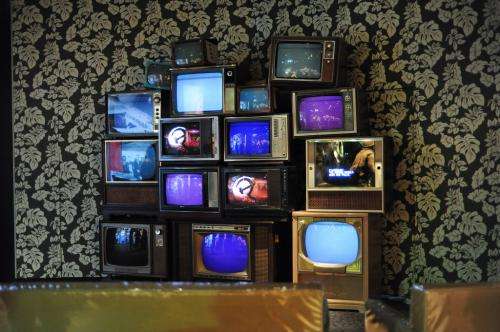We're still glued to the small screen, mostly – but that screen is getting ever smaller

Communications watchdog Ofcom have released a report which reveals that, after decades of continual growth for the first time, the number of UK households with a television has fallen, from 26.33m at the end of 2012 to 26.02m at the end of 2013.
Behind this decline is the rapid rise of households that have replaced television with broadband, estimated to number close to 1m, watching television programmes only on the internet through BBC iPlayer, Channel 4 4OD, ITVplayer and similar services.
This perhaps not surprising statistic nevertheless demonstrates the major challenge to the broadcast media status quo.
It's worth making clear that this decline is not because the British viewing public have become television Luddites, adopting a highbrow attitude to the debased nature of today's TV programming that still lies at the heart of popular culture. Rather the change is not what we watch, but what we watch it on. It's also a symptom of how entertainment has grown to encompass digital platforms and include social media, video games, and websites in general.
Fewer TVs, less time in front of them
The writing was on the wall: while 69% of UK households have high-definition televisions, global television sales have been in decline since 2011. There is a general consensus among manufacturers that we are not replacing older television sets, instead preferring to invest in smartphones and tablets.
We are buying fewer televisions and we are watching less television too: average viewing has fallen below four hours for the first time since 2009. Crucially, younger people watch less TV than their elders: digital diaries of the viewing habits of 16 to 24-year-olds over seven days reveal this age group watched only half their programming as live television broadcast. Instead younger people are the largest consumers of programmes on DVD or Blue-Ray and the most avid watchers of short video clips online (8% of their viewing). That BBC Three, with its younger audience, has moved online-only is an indication this change has been recognised.
Other seismic shifts in television use include greater use of time shifting – we've been able to record live shows for later viewing since VHS recorders in the 1970s, but digital television recorders, set-top boxes with integrated hard-drives, catch-up services, and series-record buttons have transformed our television habits, as have Internet Protocol TV (IPTV) services such as YouView, Sky+ and Virgin on demand.
All these are only going to grow, not least because of the boom in mobile devices. The report finds 44% of UK adults own a tablet, compared to 2% of households in 2011. Those with smartphones have risen from 27% in 2011 to 60% in 2014. And in July 2014 the BBC reported that 47% of iPlayer requests came from tablets and mobiles, up from 25% in October 2012. Mobile network operators report video streaming accounts for two-fifths of the mobile data we use.
So television manufacturers have to respond to our changing habits. Integrating IPTV services into "smart TVs" is one step, but so far only 11% of households have one. Other approaches are Wi-Fi-enabled IPTV dongles, such as Apple TV or Google Chromecast to add these services to existing digital sets.
Rediscovering the social side of TV
With two teenage children in my family, the impact of broadband and mobile phones on what is or is not watched in the living room has been noticeable. Our TV consumption extends across a greater range of devices, but we still quite often sit on the sofa together.
The fly-on-the-wall Channel 4 series Gogglebox is successful partly because it reflects back the experience of life in our living rooms which, unlike a visit to the cinema, has always been a shared, socially active experience. Technologically-rich households filled with games consoles, laptops, tablets and smartphones are less likely to foster the same collective habits. The dispersion of programmes across many channels has also dispersed the audience; once to different rooms of the house, now to different screens.
Of course this has serious implications for the television market. Sky's current multiscreen package, which lets you watch Sky on different devices simultaneously, seems at £11.25 per month not so attractive when the Sky Go app and online service offers its programmes to subscribers for free via broadband.
The demands for HD-quality streaming across superfast broadband, including 4G and faster mobile networks, will require greater data capacity and more sophisticated compression of multimedia. For organisations like the BBC, finding ways to track usage of online services such as iPlayer back to households will become increasingly important for monitoring television use in order to justify the license fee.
When the internet's effects began to really emerge in the late 1990's people made rash proclamations about the death of television. As any media historian will tell you, new communications technologies do not simply replace existing media, they coexist. Newspapers, film, radio and television continue to exist now in the age of the internet as they have done in the century before, it's just that their relations are changing. Television, as we understand it, continues to dominate our cultural lives, but in ways that are more diverse and dispersed than ever before.
Source: The Conversation
This story is published courtesy of The Conversation (under Creative Commons-Attribution/No derivatives).
![]()


















